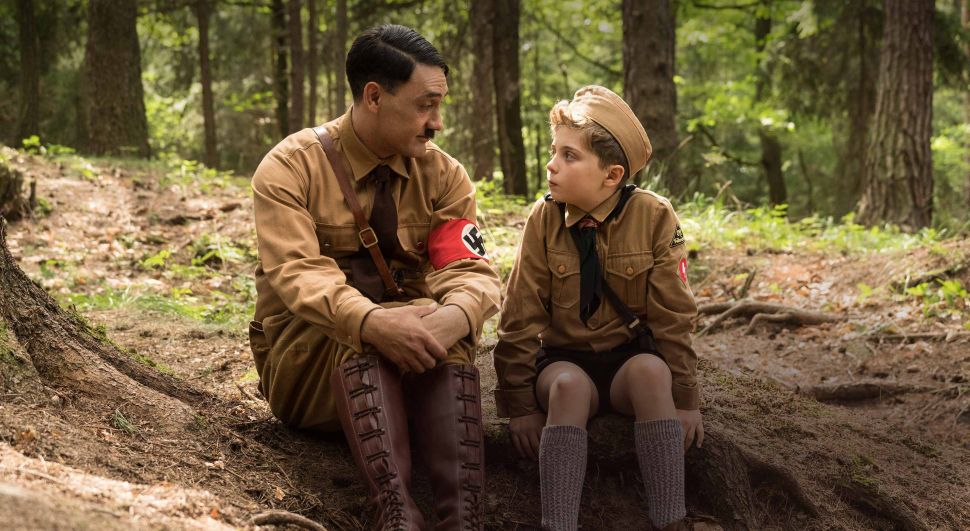Directors graduating from Marvel and Star Wars are making their best work
Knives Out and Jojo Rabbit show two directors at their best

The Fox Searchlight production logo appeared before Jojo Rabbit with a heavy sense of irony. How far and wide did the studio have to search to discover Taika Waititi, the Oscar-nominated director of Thor: Ragnarok? If this was an art house film, it was the kind that co-stars Scarlett Johansson and grosses $64.6 million. Yet it had the hallmarks of independent cinema: an unusual perspective and an uncomfortable message.
A few weeks before, audiences turned out for Rian Johnson’s Knives Out – a similarly uncommercial update of Miss Marple that happened to be helmed by the director of the previous Star Wars, and star the current James Bond. By the end of its run it had grossed over $300 million.
This is the new normal in a world where franchise movies have become a finishing school for esoteric filmmakers. With Marvel and Star Wars in the rear-view mirror, Waititi and Johnson have both been able to return to their idiosyncratic impulses and, crucially, bring the cast and crowds of Disney with them.
- 2020 movies: what you should watch this year
- The best Netflix movies
- How to watch the Star Wars movies in order, including The Last Jedi
It wasn’t always this way. Not so long ago, the biggest movie franchises in the world were inextricably tied to their auteur directors, for good or ill. Only Peter Jackson had the experience to step in when Guillermo Del Toro backed out of The Hobbit, leading to a rushed trilogy that Jackson directed by the seat of his pants, with the final result telling that story. A few years earlier, during the making of The Phantom Menace, Star Wars was George Lucas, and so nobody stopped the prequels sliding off a cliff as the director followed his instincts.
Studios have learned since, adopting something closer to the Bond model, where the direction of a series is steered by its producers. Kevin Feige has described Marvel Studios as a “shared sandbox” that directors step into, rather than an environment where they can expect total creative control.
That might not sound like a particularly attractive proposal, but in reality it’s lured a number of directors famed for their autonomy and distinctive voice. It was Joss Whedon who persuaded Shane Black to let go and trust the machine; to allow Feige and friends to take care of the moving parts of Iron Man 3 so that he could focus on the story at its centre.
“When I was leaving to go home, Kevin Feige was staying 'til midnight working to get the details right from these comic books,” Black told Screenrant.
Sign up for breaking news, reviews, opinion, top tech deals, and more.
Part of the appeal must be the knowledge that the machine can go on afterwards. A franchise is no longer a decade-long commitment that will keep a director pinned when they get the itch to leave and make something else.
It’s a system to the benefit of Disney and Marvel, who get to absorb the credibility and expertise of acclaimed directors. And it’s proven to be a fantastic springboard for the filmmakers who come out the other side.
Both Jojo Rabbit and Knives Out are pet projects their directors couldn’t get made. Waititi first optioned Christine Leunens’ novel Caging Skies, the story of a Hitler Youth convert who discovers a Jewish girl hiding in his home, in 2011. His script made the Black List of Hollywood’s best unproduced screenplays a year later. But studios wanted a big name star to play Hitler, and perhaps understandably given the reputation of the character, Waititi couldn’t secure one. Instead, he returned to New Zealand to make What We Do In The Shadows.
It was only during post-production of Thor: Ragnarok that Fox Searchlight offered to fund Jojo Rabbit, with Waititi himself as the Fuhrer. A film that was conceived on a tiny budget as a character study was able to widen its scope, and the world was treated to Sam Rockwell in a cape and eyeliner, firing a machine gun in slo-mo.

Knives Out has been kicking around even longer, since Rian Johnson made his film noir breakthrough with Brick in 2005. It’s hard to imagine that Daniel Craig, Jamie Lee Curtis and Chris Evans would have signed up back then. But in the wake of The Last Jedi’s $1.3 billion box office, Baby Driver studio MRC was happy to part with a paltry $40 million. The plan was to shop the script around at Toronto Film Festival, but the film was sold before Johnson ever got there.
Make no mistake, these movies are strange success stories. They deal in difficult ideas. Empathising with Jojo involves accepting that not every Nazi was evil – that, born in another time or place, any of us might prove as malleable. Knives Out suggests that, when pressed, America’s wealthy liberal elite will side with those who share its tax bracket rather than its ideals. These are hard and ugly truths delivered in sugary capsules, not obvious popcorn fare.
Perhaps that’s why they’ve earned the attention of the Academy; Jojo Rabbit is nominated for Best Picture, and Knives Out for Best Original Screenplay, categories Marvel and Star Wars have rarely troubled. Their box office numbers, though, are down to the audiences these directors have inherited from the big franchise films.
There’s a commonly expressed worry that Disney is homogenizing mainstream cinema; that every summer for the next decade is earmarked for an Avengers, Star Wars, or Frozen sequel. That may be true, but what we’re seeing is an almost opposite phenomenon happening in parallel – the machine producing bizarre blockbusters as byproduct. Former franchise directors are following up with their dream projects, leaving big-budget cinema a more varied and exciting place as a result, despite Disney’s dominance.
The final irony, of course, is that Knives Out has been so successful that it’s now turning into a franchise for Lionsgate. Rian Johnson is already working on a sequel. Give it another ten years and we’ll all be moaning about the endless entries in the Benoit Blanc cinematic universe.
- How to watch the Marvel movies in order
- Black Widow movie release date: everything we know
- WandaVision release date: what's next for the Disney Plus hero?
- The Falcon and the Winter Soldier: everything we know

Jeremy is TRG's features editor. He has a decade’s experience across publications like GamesRadar, PC Gamer and Edge, and has been nominated for two games media awards. Jeremy was once told off by the director of Dishonored 2 for not having played Dishonored 2, an error he has since corrected.